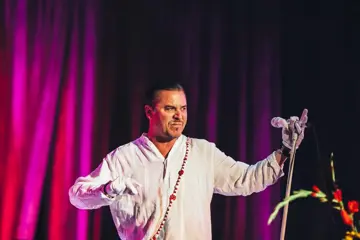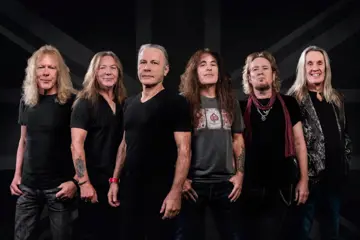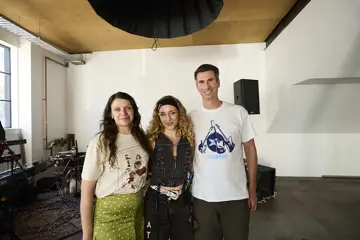There’s something about writing wizard Dan Harmon that makes him so relatable. Perhaps it's the transparent relationship he’s nurtured with his fans, or maybe – like the rest of us – he’s very good at finding ways to procrastinate when there are a million other pressing tasks at hand. “I’m playing a cookie collector game, where I collect cookies,” Harmon begins from the lounge of his animation studio in California.
One of many projects on the go is Adult Swim hit animation Rick & Morty; the third season of which is within reach. “We’re just wrapping up writing the last episodes, and I just saw the first colour cut of the first episode, so that’s where we’re at.”
But he’ll have to take a break from the cult hit briefly as he brings his live podcast, Harmontown, to Australia. “I’m so excited to finally be heading to Australia that I’m only slightly put off by reports of spiders that can carry a bat up a fridge,” he says. “Do you have any idea how many spiders are down there? I’m a big spider guy – as in, I’m terrified of spiders.
"I’m only slightly put off by reports of spiders that can carry a bat up a fridge.”
“I keep telling these Americans that are warning me, ‘It’s the Sydney Opera House – I think they’ve fumigated it.”
A 2014 documentary following Harmon and co around the US on their first podcast tour shows intimate details of his personal and creative life. Some of the anxieties throughout the film came from the improvised nature in which each live podcast comes together. But the lack of a game plan is also what makes seeing Harmon live so great. “The guy you saw in the documentary getting ready for his first show, there was a fear I had then that never returned after that show,” Harmon reveals. “Some switch got thrown in my head that I was in a legitimate place and that I needed to therefore have a show, but since then I’ve done so many shows where it’s like, ‘Look, we’ll figure it out.’”
Don't miss a beat with our FREE daily newsletter
“There have been a few stinkers here and there,” he laughs. “I’m going to try not get too loaded. I’m going to be thinking about stuff on the long plane flight.”
The raw nature of each podcast sees Harmon bare all for fans, which has had an impact on the way he approaches writing. “I think that over time, I’ve gone from a place of defensiveness to very fearful reaching out and I think that those are the two big extremes when you’re a nerd. You can either be defiant about your right to one and to be alienated and separate from people, or you can be equally confident about the fact that you are.”
Surprisingly, Harmon never bookmarks ideas forged on stage for reworking or developing later down the track. “It’s more the opposite; if I’m struggling on something while I’m writing a script, sometimes it’ll erupt into something I'm talking about on stage,” he reveals.
“The great thing about podcasting is, I don’t walk off the stage with any retention of what I’ve talked about. I’ll have a vague recollection that I got upset about something and my throat will hurt a little bit, so I’ll remember, ‘Oh yeah, I was yelling about video games.’
"Between getting drunk on stage, but more importantly, there’s a sort of blackout that occurs when you have to give yourself over to monitoring people that you’re performing for.”
The audience connection is also something Harmon strives towards across the other projects he’s developed. “I guess I’d like to think the reason why Community and Rick & Morty - in spite of being totally philosophically different - both get a strong response from fans is because they’re sincere. There’s no barrier between the people making the show and the people in the audience.
“There’s always a class barrier, I think,” Harmon says of a lot of other shows out there. “The stuff that I’ve worked on, I’ve never written down to anybody and I’ve never encouraged that, and largely simultaneously ignored the audience and considered them the most important thing in the world by saying, ‘Well, these people need nothing less than the thing I think is perfect,’ because that way there stands a small chance of us connecting somehow before we all die.”














